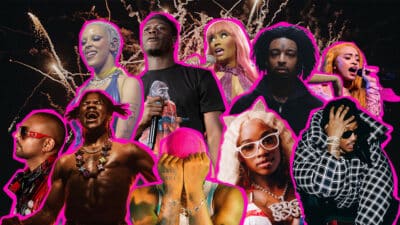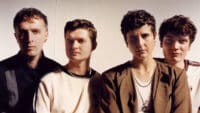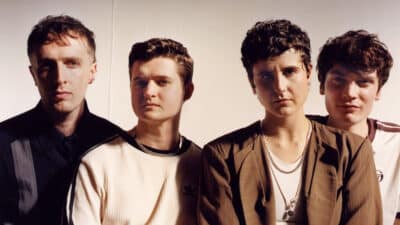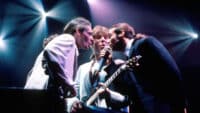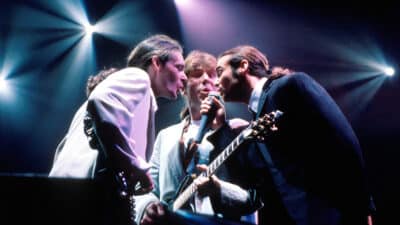Interview
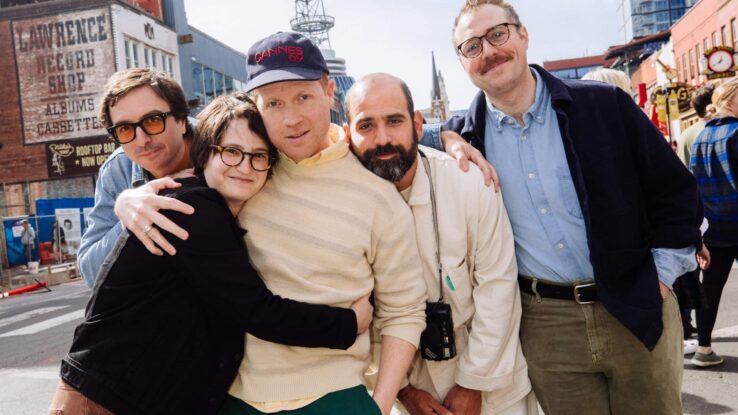
Interview
My Greatest Hits: Alex Bleeker of Real Estate
With news of a return to the UK in October, bassist and founding member Alex Bleeker looks back at the band's sparkling career
New Jersey indie rock royalty Real Estate recently returned with their sixth album, Daniel. Nostalgic for their glowing early years – at a time when we perhaps needed this feeling most – the record still pushes Martin Courtney, Alex Bleeker and co. forward with some of their most refined songwriting.
This was clear as the pair performed a stripped-back set in East London, where they recently performed new ear-worms such as ‘Flowers’ and ‘Water Underground’, before finding a local pub and catching up with old friends and label-mates in the city that has loved them since their inception in 2008. After learning how to Split the G with a Guinness or five, Bleeker sat down with us to share some of the most cherished moments of their career before they return for a run of UK shows in October.
Releasing our debut album
Looking back, ‘Beach Comber’ is the track that has stood the test of time from that record – it’s quintessential Real Estate, and the one that people still clamour for at our shows. That was definitely always in there, and that was part of the very first batch of songs that we worked on together as a band, but at the time the hit single was ‘Fake Blues’. People still know the song, but it’s been lost in the shuffle of time. Back then, it held the position that ‘Beach Comber’, ‘It’s Real’ or even some of the later stuff like ‘Darling’ hold in our sets now, where we couldn’t get away with playing a show without playing ‘Fake Blues’ at that time. Now it’s more of a rarity, which is cool and fun to play with.
The songs for that album were written on a rolling basis, but we had our first batch of songs that we were playing live, and ‘Fake Blues’ came through a matter of weeks later in the second batch of great songwriting from Martin [Courtney]. I was late to rehearsal and I remember showing up when we were practising in the basement of this DIY venue in Brooklyn. I could hear ‘Fake Blues’ being played by the band for the first time, and I just knew that it was a song that felt and sounded so good. I walked into the basement and I looked at the rest of the band, and – it was kind of tongue in cheek, but kind of serious – I was like, “we’re gonna be huge!” [laughs]
It was one of those moments, I don’t know how to describe it. But in the early days especially, there were a lot of those moments back-to-back. To go back to ‘Beach Comber’ specifically, I remember exactly where I was sitting when I learned the bass line. I was living at my mom’s house in suburban New Jersey and Martin was living in his parent’s house across town. We were gonna give this band thing a go, you know, we’d been playing music together forever. And I just remember sitting there in the living room with an unplugged electric guitar, learning the song with him. That was 15 years ago, maybe even 16, but I’ll always remember it was a clear definitive start to something.
Our first feature on Pitchfork
This was maybe a few months after that. In those early days, it happened really fast, which was extraordinary and exciting. I’m talking about Pitchfork and whatever version of it exists now, but it was such a different climate in those days, with all the blogs and everything. You could play a few shows and if the right people caught your drift in New York City, you’d have a chance of making it on Pitchfork.
But it was was shocking to me. There was a photo of me and, you know, this is not a press photo, this is not an ordained thing that came through a publicist, this is something that somebody pulled off Facebook. It was a crappy live shot – it might still be floating around on the internet, if you look really hard for it now. It was for the song ‘Black Lake’ off of our debut album, I think for a feature on Pitchfork that used to be called On Repeat.
It got posted and it was akin to the feeling – I remember even thinking this at the time – of my generation’s version of… you know when you see rock ‘n’ roll movies where they hear their first seven inch on the radio somewhere in the world for the first time and they’re going crazy and jumping up and down? It felt that way. I was living in New York City at the time and I remember getting on the subway and it’s so insane, right, but I was like, ‘I wonder if anybody recognises me right now?!’, you know?! Like a crappy blurry photo of a brand-new band with one song and made it to Pitchfork for a couple of hours. But it was monumental, and looking back, it was the beginning of the rest of our lives. You could feel that it was like, ‘Okay, we’re doing something, we’re in a real band’. Especially in those days, a recognition from Pitchfork was an indicator of that.
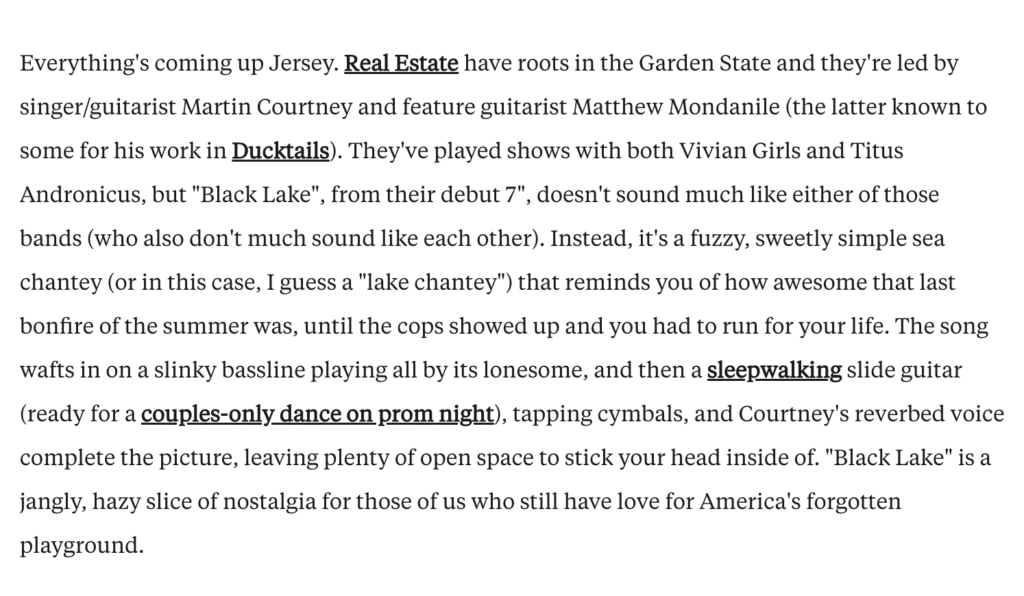
Our first European tours
I don’t know if folks over here realise how extraordinary it feels to be an American band to be invited to play on another continent. That was something that was the ultimate goal in those early days.
It’s crazy to look back on but all the travelling I’ve done has been through and because of this band. I had not really been out of the United States before that. I’d been on some Caribbean vacation, but at the time you didn’t need a passport to go there. So I had to get a passport to tour. This wasn’t really that long ago, but it feels like a completely different age when I say these things, but I bought a digital camera. I had a flip phone when I first went to the UK and Europe in 2009 and it was like, oh, you know, you’re gonna have to take photos! I think that camera’s still floating around.
It meant something so significant to us to be invited to play in the UK and in Europe, and I will never forget the feeling on my first night. It felt so huge to us, and it just goes to show that it’s all relative. We didn’t have management yet, but we got over there and we’d strung together this DIY plan of where we were gonna get our gear and who was gonna drive us. There were people who had little rock ‘n’ roll businesses, renting vans and renting equipment, and it felt so professional to us, but looking back it was quite unprofessional and scrappy [laughs]!
We landed at Heathrow then went to somebody who I’d never met before’s house and crashed on the floor. It was like [English accent] “Oh, yeah, you’re gonna stay at me mate Julia’s place,” and that had been arranged for us. I was like, I’m in another country and music has brought me here.
Now that we’re coming back to the UK all these years later, I can hold those memories in my mind and appreciate the journey. For that reason, like being with Domino, which we can talk about in more depth, it feels like another home to us over there. It feels really cosy and good. I mean, you must have felt it when we were having the split the G moment… We’re welcome here in this part of the world. If you told the 2009 version of me that I would be having that kind of experience, it would probably have blown my mind.
Signing to Domino Records
This was a massively significant thing for us to do, and readers of this will have to remember that when we signed in 2010, I think, we were signing to Domino in the shadow of the great Merriweather Post Pavilion, and all of Animal Collective’s records, to be honest. That’s another funny thing to look back on, because I’m friendly with those guys now, but the thought of even brushing shoulders with them, and the pedigree and history of Domino, the fact that we were even speaking to them, was mind-blowing to us. There were other fantastic labels in the running who had thrown their lot in the ring to put up Days, but we dug in: Domino or bust. We were so certain of it: this is the greatest label in the world. That was the dream goal, so to have that happen was incredible.
‘It’s Real’ and ‘All The Same’ existed and were being played at live shows, and the song ‘Out Of Tune’ was already out in the world, but they had faith in us. It was on spec, largely. They were like, “We love your first record and what you guys are doing, and we think you’re gonna make something good. Let’s start this relationship together”.
Those first three records just felt like this exponentially ascendant time. You get a swagger and confidence that kind of starts to pull you through, like, we can do no wrong. It was hit after hit after hit because of course the adoring public is always going to love us and at this rate we’ll be in Wembley Stadium at no time, you know? It really does create that sort of feeling in you, and I don’t say this with any bad feelings, but that is the early, youthful, beautifully naive period of the band – where you’re not aware of what I sometimes call “the indie-rock glass ceiling”. Bands go through cycles like this, and as you mature as a band, you start to see the contours and the outlines of what it is you’re doing.
There’s the first record, and then Days, which is a slightly more quote-unquote professional sounding record, but really has ways to go, just fidelity-speaking. And then you get to Atlas and it’s like here’s this crystalline, sparkling version of this thing that we’ve been honing. I feel really lucky that we we were able to do that and not get tripped up in our own heads for those first three records because can have anbidentity crisis. I love all of our records, but we didn’t get there until record four, you know? It’s like records one to three were just this really early period of super fast-paced, exciting growth. A lot of fond memories from those times.
Releasing Atlas
It’s often said but Real Estate is the type of music that we would hopefully have been listening to in high school. We’re making music for a version of our former selves, of what we wanted and what we loved. So a lot of the cool things that I imagine when asked to think about milestones is having had the opportunity to meet some of those people who were so influential to us, and to then become almost peers or colleagues and just share space with them.
I’m not sure if it was the right decision or not, I think it was… but Jeff Tweedy really wanted to produce Atlas. He had thrown his hat in the ring for that and we didn’t end up doing it with him. We recorded it at Wilco’s studio but we didn’t do it with Jeff as the producer because we didn’t want it to be like “Jeff Tweedy presents Real Estate”, we wanted to be ourselves. First of all, even at that time, I realised that Jeff Tweedy wanting to produce my album – and me sitting there saying no to him – is an insane version of something. But he took it well and he was really cool about it, and he actually came by during the sessions. He came by at one point when we didn’t know he was there, because there was a big bookshelf between the live room and the control room. We were literally just jamming on a track that never got released, and we went back into the control room to listen back and there’s Jeff Tweedy sitting there in an arm chair listening to what we’re doing. He was like, “Whoa, what the hell did you guys just do?! I don’t even know what that was!”. He was really effusively complimentary about this jam that we had just put down. That’s a memory from Atlas where I was like, you gotta be kidding me. Here I am meeting one of the people who influenced us to be here in the first place.
Making fun music videos
There was a really, really valuable lesson that we learned from making the horse video for ‘Darling’. First of all, I’m just grateful for the response to the song. I’ve been thinking a lot about bands with long careers like ours – I’ll bring this back around, I know I’m on a tangent… But a band like Radiohead has been an example I’ve been using, one of the biggest bands in the world. People have their favourites like The Bends or Kid-A or OK Computer, favourites from a specific early period of the band, and they latch onto them. I’ve been thinking about that and about how great the music is, but it’s also about discovering a band for the first time in the context of where you’re at personally; it gets gets so hard to recreate that feeling, like if In Mind came out second, would that be Days?
The music is a big important part of it, but it’s also where everybody’s at in their lives that creates this sort of mythos around a couple of records in every band’s career. When those early days have gone, you have a little bit more of an expectation, more people around, more infrastructure, more direct hands on management like, more people saying they’re gonna make a great music video for this new single. Plus there’s a budget… We were a little bit hands-off and laid back, I think it was because we were confident from that three album run. But we were like, “okay yeah, find us some directors who want to make a video and we’ll read some treatments and see which one we liked the best”. No disrespect to anything we read it, and I don’t remember anybody personally, but all the video proposals that we saw were not good. They were highly glossy, super commercial feeling and they didn’t feel like us. They didn’t feel like they had a read on the band. They were more like somebody had an idea for a short film and they just put our music behind it, and everything that we were getting through official channels with fancy directors wasn’t hitting.
This was the moment I remember talking with Martin and being like, “I don’t think we can relax and just expect something good to happen – we actually have to be engaged ourselves, and we have to think about what we want and who we are in order to get something good”. We remembered this video company called Weird Days, who had actually directed our video for ‘It’s Real’ with all the dogs and stuff going on. I liked working with those guys so we got the treatment for the horse video. And it’s the funniest, most extraordinary video treatment I’ve ever seen in my life. It’s like clip art. It’s like guys in a jazz band and then suddenly: horse. We’d seen all this high gloss and then we get this thing, so we were like, this is it. This is the most extraordinary thing I’ve ever seen in my life. That was the seed of the video and it just goes to show that you’ve got to trust those instincts. Everybody remembers the horse video now, it’s extraordinary.
And then the video for ‘Water Underground’ was an idea that I’d had for years. The show Pete And Pete was so popular regionally at such a specific period of time – so if you’re reading this not exactly sure what it is, it’s all on YouTube so do yourself a favour and go and watch a couple of episodes. It was a kid’s show but it resonates for adults. It’s just so good. We all watched it as kids and I know that it influenced Real Estate as much as anything. The music in it has this great jangling nostalgic feel, and it’s about being a wistful kid in the suburbs.
The creators of the show, who wrote the treatment for the music video that we made, were really heavily involved in the music scene at the time in the 90s. Michael Stipe has a cameo on the show, I think Iggy Pop actually has a small character in the show. So I think as kids we didn’t know it but this was our first introduction to cool alternative music culture, and it made a huge impression on us.
It just so happened to be filmed right near where we grew up, and one of the stars of the show – who played young Pete, his name is Danny Tamberelli – was from the next town over from us in the suburbs, and he was this local mythologized hero. Eventually we met him through friends of friends and I kind of danced around it. You know how child actors are, it can be sensitive, but I said it’d be cool to do a Pete And Pete thing for a music video. I don’t know, I guess the time was right.
This song in particular really harkens back to the feeling and the spirit of that show. It struck a chord. And then the music was played for the creators. That was almost bigger for me than the cast, that the creators were like, “Oh, we love your music, it sounds like something that could have been in the show and I wish we could like go back in time and put it in the show.” It’s this weird cyclical thing. The show is why the music sounds the way it does, or is a part of it. I don’t know if you can imagine like, taking a day and basically being in an episode of your favourite show from when you were a kid, but it’s a very surreal feeling.
Surviving – and thriving – in lockdown
I’m glad that we’re still here. And I’m glad that we made this record on the other side of it, because I’m tremendously proud of it. It’s been four years almost exactly since The Main Thing came out, and it’s hard not to associate that with literally the beginning of the Covid catastrophe. There was, of course, a lot of other heaviness in the world during that time, but it feels like an album that has that in it. There’s a sort of weightiness to it, a sombreness underneath it, and Daniel, the record we’re promoting now, feels really breezy and light. It’s not to say now the world is so much better, because obviously it’s not. But I think there was this foreboding sense of going into something heavy, you know, and now we’ve been through something heavy, it’s still heavy, but lightness is okay. It feels like a bulb to me, like a little bit of a relief. I didn’t want to go into the studio and make another heavy, super self-serious kind of thing. Let’s bring some relief into the world. It’s like these two records really bookend Covid. So I’m happy to be moving forward, I guess is all I’ll say. It was a hard time, but we’re still here and in a way that I’m really excited about and really proud of. So that’s the thriving part, I guess.
Pandemic aside – you mentioned earlier the halcyon Pitchfork era for bands such as yourselves, but not many of your peers from that time have managed to keep it going like Real Estate. What’s been key to that longevity?
I think it’s commitment and love and truth of spirit. Also we don’t know how to stop doing it to be honest. We’re grateful for where we are at in our career and we love it. But it’s not like we’re making tonnes of money. I think those things do get more difficult as you get more responsibility, and you as you get older, but I also don’t know how being in Real Estate is going to evolve in our lives as we get even older – further away from the halcyon Pitchfork era – as the children of band members get older, responsibilities change, band members themselves just become older people. The me coming over there for “Hey, you’re gonna stay at me mate Julia’s flat” is a very different person sitting in front of you now.
I think our relationship with it has changed. And it’s bound to change even more in, let’s say the next 10 years, but it’s going to remain in our lives in some capacity. It just feels like intrinsic part of us. So I don’t know exactly what it’s gonna look like, but there will be Real Estate records ahead, there will be shows to play. What version of that remains to be seen, but I think the reason that we still exist is not that the lifestyle is so tempting that you just can’t turn away from it. It’s more labour of love than anything else.
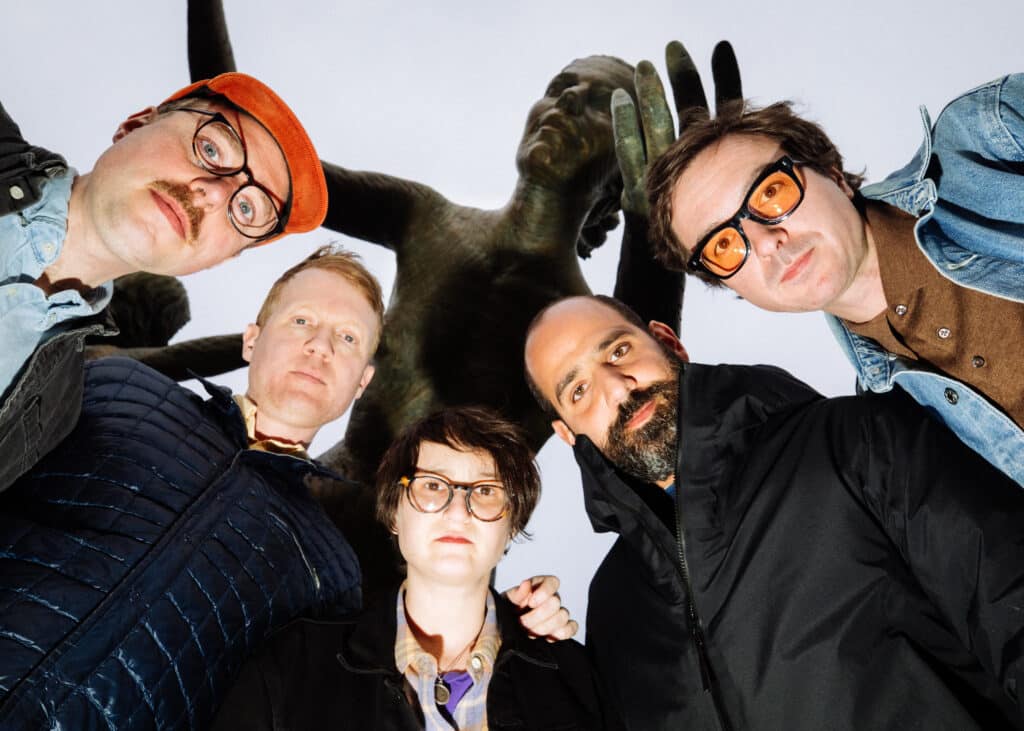
Releasing Daniel
I think as bands get older, you speak a lot about making a mature record. I think when you’re an adolescent band, or I can just speak for us personally, we thought that maturity meant density, cleverness of songwriting, addition as opposed to subtraction, experimentation, you know? I think that’s cool and I love exploring all that space and we’ll probably go back to that at some juncture. This one has the sort of lightness and breezy feeling of our earlier work but in a roundabout way I think it’s our most mature album – in that we made it in a really focused way.
It was Martin writing an email early on saying “I want to make pop songs, I want to trim the fat”. There’s this side of our band that can write a really catchy, immediately clear and obvious pop song. It’s almost a feeling like the experimental stuff is a more teenage version of maturity – it’s actually not as mature as taking stock of your life and being like, this is what we have, this is what we’re good at. Let’s go in and clear away all the stuff that isn’t serving us and focus on this one element of our sound that really excites us. And that was kind of the guiding principle. Even before all the songs were written, it was the concept. The album has a youthful breeziness to it, and I’m so glad it does because I kind of needed to feel that.
We recorded it in Nashville, in this studio called RCA Studio A, which sounds historic and is historic. The shorthand I’m using for that is ‘Jolene’ by Dolly Parton was recorded there. So many other country legends like Willie Nelson, Waylon Jennings, Chet Atkins, Charlie Pride are all over the walls in there. If you just close your eyes and imagine what that might look like, this is what I thought a professional recording studio looked like when I was like 11 years old. It’s a massive room the size of a gymnasium with parquet floors, and you could probably fit a whole orchestra in there easily with really beautiful equipment. So it’s cool to still be progressing in that way. It’s like, well, we’ve never been in a room like this before, even in all of our years of recording. It felt like a professional notch on the belt of accomplishment. We get be in this space for our time here.





